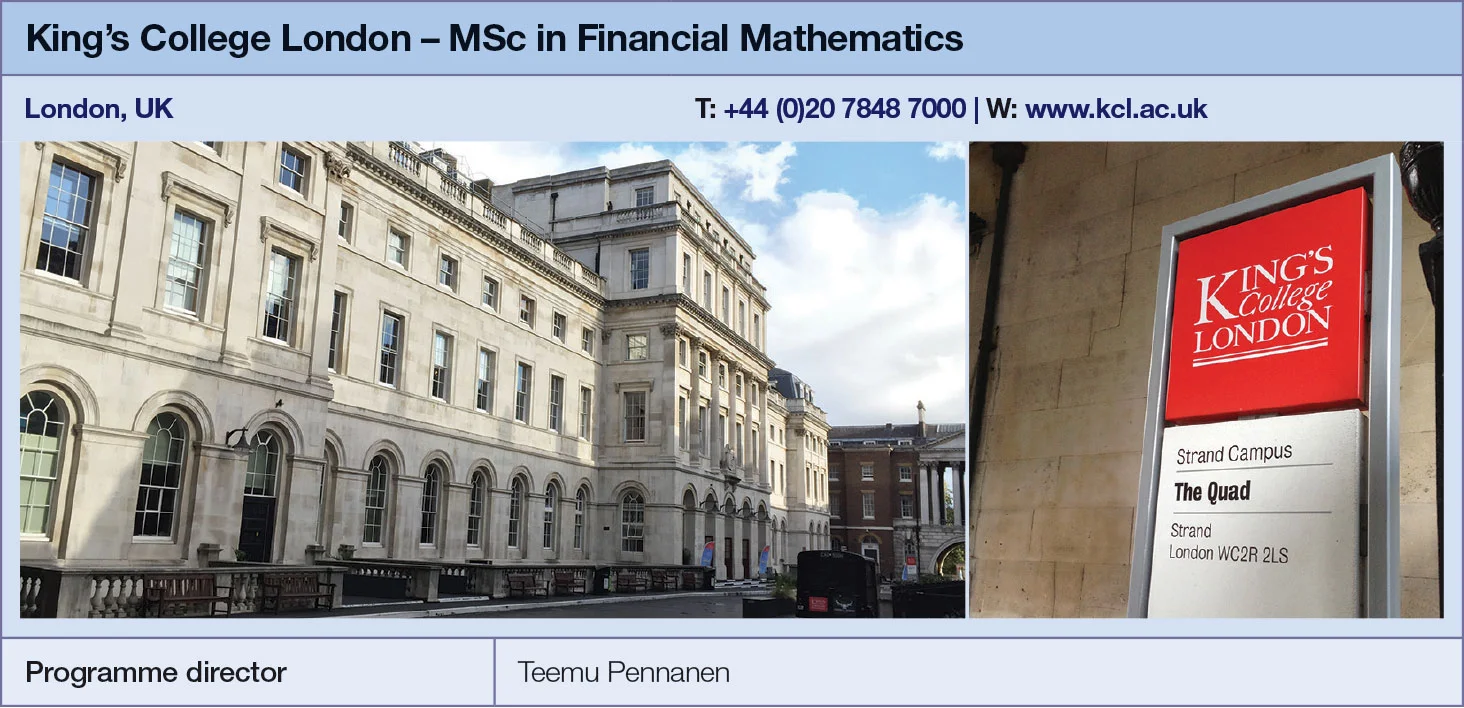
Quant Guide 2017: King’s College London
London, UK

MSc in Financial Mathematics | metrics table at end of article
The law of the instrument describes a well-known cognitive bias that quants were accused of in the aftermath of the financial crisis: if you only have a hammer, then every problem looks like a nail.
It’s a bias King’s College is trying to drum out of the next generation of quants.
“Much of mathematical finance was criticised after the crisis for causing some of the problems. They were using risk-neutral valuation in places where it should never have been used,” says Teemu Pennanen, leader of the school’s MSc in financial mathematics.
King’s has responded by giving students the chance to learn about incomplete markets – a branch of finance theory that Pennanen says has been neglected by many programmes.

“The right way would have been to use the incomplete markets theory – that’s what we’ve introduced into our programme recently. Incomplete markets is a mix of economics and optimisation theory; optimisation theory is something that’s been missing from most mathematical finance teaching. You see more and more of it in the literature, but I guess it hasn’t filtered down into MSc programmes,” says Pennanen.
It also hasn’t completely taken root in the industry, he adds: “After the crisis, they hired a lot in risk management, model validation, but they still use risk-neutral valuation in some of the trading desks, and you hear from many practitioners that this is not enough for modern banks and the trades you have to deal with.”
The programme accepts around 30 students per year. Over the course of the programme, students get the opportunity to master C++ and MatLab, while R is taught as part of the econometrics course. Up to four electives can be chosen, which range from recent topics in financial mathematics to more traditional specialisms in exotic derivatives.
The introduction of Python is also on the agenda.
Students have access to 13 Bloomberg terminals during their studies, which are used in various ways – for example, to gain practical insight into how financial markets operate, develop investment strategies and source research data.
King’s College is a constituent of the University of London, so optional modules at other member universities (including the London School of Economics and University College London) are available to its students.

Click here for links to the other universities and an explanation of how to read the metrics tables
Only users who have a paid subscription or are part of a corporate subscription are able to print or copy content.
To access these options, along with all other subscription benefits, please contact info@risk.net or view our subscription options here: http://subscriptions.risk.net/subscribe
You are currently unable to print this content. Please contact info@risk.net to find out more.
You are currently unable to copy this content. Please contact info@risk.net to find out more.
Copyright Infopro Digital Limited. All rights reserved.
As outlined in our terms and conditions, https://www.infopro-digital.com/terms-and-conditions/subscriptions/ (point 2.4), printing is limited to a single copy.
If you would like to purchase additional rights please email info@risk.net
Copyright Infopro Digital Limited. All rights reserved.
You may share this content using our article tools. As outlined in our terms and conditions, https://www.infopro-digital.com/terms-and-conditions/subscriptions/ (clause 2.4), an Authorised User may only make one copy of the materials for their own personal use. You must also comply with the restrictions in clause 2.5.
If you would like to purchase additional rights please email info@risk.net
More on Quantitative finance
Baruch, Princeton cement duopoly in 2026 Quant Master’s Guide
Columbia jumps to third place, ETH-UZH tops European rivals
Quant Finance Master’s Guide 2025
Risk.net’s guide to the world’s leading quant master’s programmes, with the top 25 schools ranked
Baruch maintains top spot in 2025 Quant Master’s Guide
Sorbonne reclaims top spot among European schools, even as US salaries decouple
Quant Finance Master’s Guide 2023
Risk.net’s guide to the world’s leading quant master’s programmes, with the top 25 schools ranked
Baruch topples Princeton in Risk.net’s quant master’s rankings
US schools cement top five dominance as graduate salaries soar
Is it worth doing a quant master’s degree?
UBS’s Gordon Lee – veteran quant and grad student supervisor – asks the hard question
Starting salaries jump for top quant grads
Quant Guide 2022: Goldman’s move to pay postgrads more is pushing up incomes, says programme director
Quant Finance Master’s Guide 2022
Risk.net’s guide to the world’s leading quant master’s programmes, with the top 25 schools ranked







